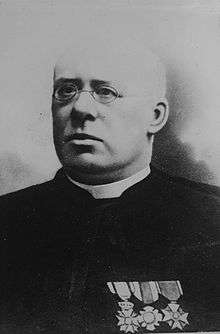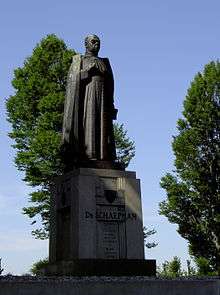Herman Schaepman

Herman Johannes Aloysius Maria Schaepman (b. at Tubbergen, Overijssel, 2 March 1844; d. at Rome, 21 January 1903) was a Dutch priest, politician and poet.
Life

He made his studies in the college of Oldenzaal and the seminaries of Culemborg and Rijsenburg, was ordained as a Catholic priest at Utrecht in 1867, and obtained the degree of Doctor of Divinity in 1869 at Rome. In 1870, he was professor of church history at the seminary of Rijsenburg. At the same time he became a collaborator on De Tijd, and in 1871, in conjunction with Dr. W. J. F. Nuyens, he founded the periodical De Wachter (from 1874–83, Onze Wachter).
He was the first priest to be elected to the States-General, and he campaigned for the emancipation of the Catholics. In 1883 he formulated and presented a programme of action, his motto being "Catholics constitute a political personality which demands liberty." He was either ignored or opposed. But even at that time he entertained the idea of an eventual coalition between Catholics and Protestants, and for that reason supported the project for the revision of the Constitution (1887). The revision of the school-law, as part of the school struggle was mainly due to him.
Schaepman developed the qualities of a statesman. The democratic movement was a fact; and, instead of vainly trying to stem it, he endeavoured to secure a hold on it. For this reason he acted independently in regard to the law concerning personal military service (1891–98), the Tak elections law (1894), and the compulsory education law (1900). his Catholic opponents had, no doubt, good intentions, but they forgot that now they had influence and were able to obtain what was formerly beyond their reach.
Schaepman, in the beginning of his political career, was averse to paternalism in government and wished to limit its functions to what was absolutely necessary. Later, however, he followed more in the footsteps of von Ketteler. Instead of allowing inevitable events to become detrimental to Catholics, he sought to shape them as far as possible, to Catholic advantage. One of Schaepman's achievements was the coalition which, in conjunction with Dr. Kuyper, he brought about between Catholics and anti-revolutionists. Schaepman's merits were recognized by Pope Leo XIII, who bestowed upon him the rank of domestic prelate and prothonotary Apostolic.
Orator
For many years he was considered a leading Dutch orator. His convincing, powerful manner was first displayed in his "Park speech", delivered in Amsterdam (1871), and was evinced in his speech at the Congress of Middelburg (1872) and in those on Pius IX, Vondel, the Maid of Orléans, De Taal, Daniel O'Connell, Michel Angelo etc. His last oration, delivered in 1902, was in honour of Ferdinand Hamer.
Works
Schaepman was a major poet. The appearance of his first poem, "De Paus" (published in 1866), was a literary event. Among his later poems those of especial note are: "De Pers, De eeuw en haar koning, Napoleon" (1873), and his master work "Aya Sofia" (1886).
Schaepman ranks equally as prose-writer and poet. By turns lofty, incisive, sarcastic, vigorous, witty, his whole soul finds expression in his prose, the originality of its style being so striking that its authorship is recognized at first glance. His principal prose writings are collected in five volumes under the title "Menschen en Boeken" (Utrecht, 1893–1902).
References
- Attribution
 This article incorporates text from a publication now in the public domain: Herbermann, Charles, ed. (1913). "Herman Schaepman". Catholic Encyclopedia. New York: Robert Appleton. This entry cites:
This article incorporates text from a publication now in the public domain: Herbermann, Charles, ed. (1913). "Herman Schaepman". Catholic Encyclopedia. New York: Robert Appleton. This entry cites:
- Brom, (Haarlem, 1903)
- Hendrichs (Leyden, 1903)
- Binnewiertz (Leyden, 1904)
| Assembly seats | ||
|---|---|---|
| Preceded by Willem Cremers |
Member of the House of Representatives for Almelo 1891–1903 |
Succeeded by Piet Aalberse |